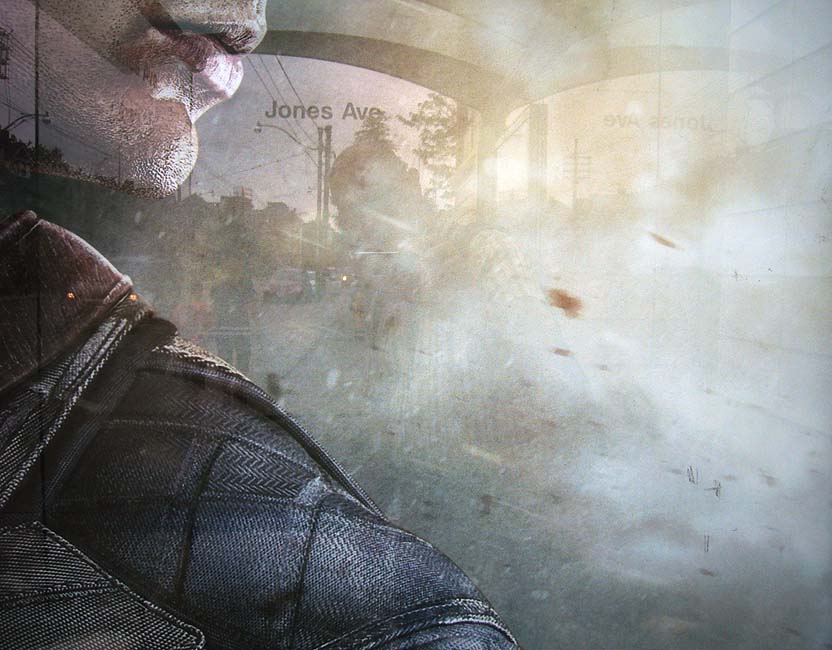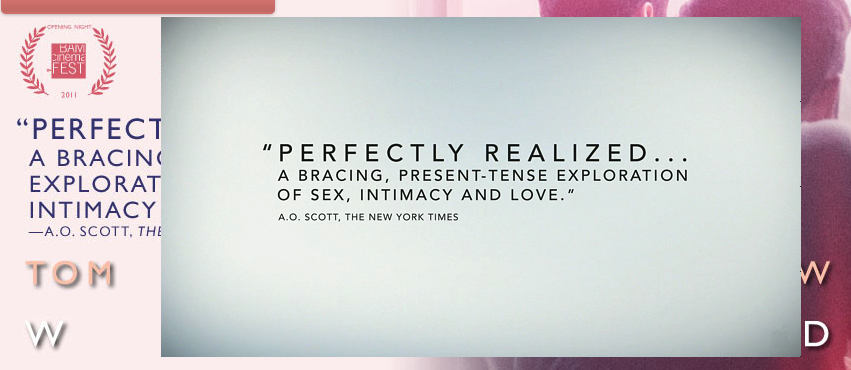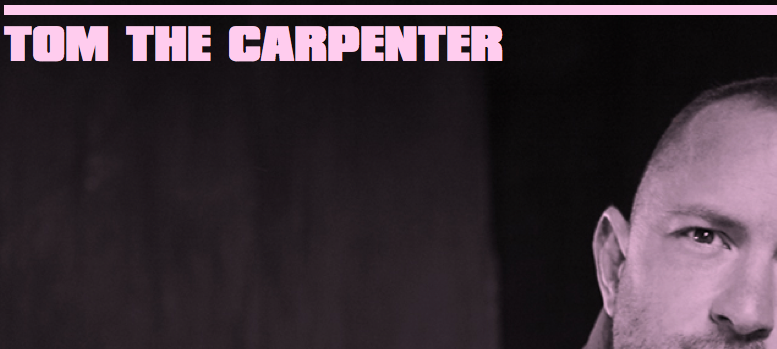
Uniformed shoulder

The foregoing posting appeared on Joe Clark’s personal Weblog on 2011.08.19 16:02. This presentation was designed for printing and omits components that make sense only onscreen. The permanent link is: https://blog.fawny.org/2011/08/19/uniformed-shoulder/
Yes, if I were Andrew Haigh, that’s the quote I’d have run with, too
As Ed Champion and I are the only writers to have voiced any reservations about it whatsoever, the independent homosexualist film Weekend’s odds of success were high long before its fate was sealed with the imprimatur of Tony Scott of the Times. (I told you that already – twice.) Scott found the movie “perfectly realized,” Weekend’s new trailer reminds us.

I would have run with that quote, too. (Had you caught the Apple trailers page at the right instant this morning, Weekend was one of the featured pictures.)
So: Let’s just see how many of the claimed viewers in this catchphrase show up to see the gay movie “even straight men will like.” Like guessing the number of jellybeans in a jar, this could become a fun little wager.
The foregoing posting appeared on Joe Clark’s personal Weblog on 2011.08.19 15:58. This presentation was designed for printing and omits components that make sense only onscreen. The permanent link is: https://blog.fawny.org/2011/08/19/weekend-trailer/
Remarks from Andrew Wilfahrt’s father Jeff Wilfahrt
The late Andrew Wilfahrt’s father Jeff read my previous post, in particular the section about his son, and wrote me a thank-you message. I invited Jeff to write whatever he felt appropriate about a little-understood but, I think, crucial aspect of Andrew’s decision to join the U.S. military – his need for manly camaraderie, as I called it. As Jeff describes, “male” camaraderie is probably a better term.
Jeff Wilfahrt’s remarks are reproduced here with permission and gratitude.
I found your post of interest and would like to add some comment and content to your statements.
I speak as the father of Cpl. Andrew Wilfahrt, 552nd MP Company, KIA 2011-02-27, Kandahar, Afghanistan.
My wife and I have been married 33 years. Andrew was our eldest child. He died at the age of 31 and near what would have been his 32nd birthday.
To me it was obvious from his childhood onward that Andrew was not a “boy’s boy.” He didn’t rip the wings off of flies, he didn’t slingshot-break a house window, he didn’t gravitate to roughhousing; rather, he tended towards intellectual things like maps, music, mathematics, and, most telling of all, kindness towards others.
My wife and I have friendships that date back to our own childhoods. Andrew grew up with playmates who were the progeny of old friends. As we all aged and the children entered school cycles, these relationships drifted apart as each child experienced their own divergence and socialization.
As Andrew entered puberty he already knew he was outside the majority, the heterosexual majority. He feigned for a year or two that he was part of that majority, but he was fortunate, perhaps more than many, because quite frankly his sexuality was not an issue to his mother and me.
He found the best comfort in the teen years among teenage girls. They were kinder and far more accepting than his male counterparts. He maintained a few male friends, all of high intellect like himself, but for the most part the female camaraderie won out.
When he attained his driver’s license, he was free to head into the city and join the local gay scene. And join he did. I think it fair to say he came to flaunt his lifestyle to the point where, when he graduated high school, he had already acquired a full embrace of the local community. He dated, he hung out, he partied, and he indulged. But there remained something within that was unrequited.
He went down the dark ladder, by which I imply he dove headlong into drug abuse. It was, after all, a part of the scene from which he sought society. By his mid-20s it caught up with him both physically and spiritually.
He bounced back into our lives and, together with him, his mother and I jumped into that hole of despair and the three of us clawed our way back to wholeness. He rebuilt himself physically and spiritually. He became a routine user of a local gym. He read voraciously the works of philosophers and composers. He redefined his relationships, and I think that is the point where he seriously began to evaluate what he felt had been missing. Some of that was to see how his mother and I had these lifelong deep-seated friendships, and he could not help but ask why this component of life was missing in his.
Having held many insignificant low-paying jobs, and with the age of 30 staring him in the face, he began casting about for a future. He had deferred a college education because he thought it would slow him down. So at the age of 29, as I prodded him at an evening meal to consider applying to college, he announced that for the previous two years he had been contemplating a military career. He lamented that he had passed the age of 28 and thereby missed the opportunity to join the Marine Corps. So now he counseled with Army recruiters about where he might fit in their world. He settled on the Military Police. For him I think this was the right balance of service and function.
Among the things he related to us in his decision was that he sought male camaraderie that he never really found in the local community. As my sister-in-law is quick to point out, “Do people think gays join to get a date?” The answer of course is an unequivocal no.
Each year he would trot off to the Gay Pride festival and each year he would return dismayed by what he considered shallow and at times callous relationships.
It is true that he “closeted” himself upon entry into the Army. He created a cover story about a failed girlfriend and broken heart. As it turns out he never had to use it, to the best of our knowledge.
On his graduation from basic, he related how often the hetero males would dry-hump in the barracks. He was taken aback by this actually. He said he had never seen such behavior among the gay men he knew.
Because he was older than most of the recruits he found an opportunity to be somewhat paternal. He found his maturity to be an advantage, and many of the soldiers he served with appreciated him for his calming demeanor and sagacity. While in basic he was teasingly called Webster after the dictionary of the same name. He came to really like his military life. For him it provided a structure and he liked that. It came with the physical demand to maintain endurance and strength. It came with the challenge of advancement through performance. It came with the notion of unit cohesion; the sense that he was part of a larger thing; that he mattered; that he was among kindred souls.
Before his deployment he spoke of making a career of the military. His devotion to the MP life was his sole focus. He was trained and ready to serve.
Then came road duty, the boring aspect of checking identities and securing perimeters on military bases. He craved more. He applied for the linguistics program. But before he could be transferred he was deployed.
Somewhere around the six-month point he informed us that he had come to understand that Afghanistan was not ready for democracy. He was reconsidering whether a career in the military was really his path. Four months later an IED would take his life on a road just west of Kandahar.
And so he died in a place so far away never having had that one great love in his life. He had friends of the band-of-brother type that he had acquired. His loss was felt even by his commanders in the field. There is a classroom at Ft. Leonard Wood that bears his name. His name is there with others’ in Oahu, HI, and his photo hangs on a battalion wall. A Hawaii service group has named a stretch of road on the eastern shore of Oahu after him. A marble stone at Ft. Snelling National Cemetery bears his name.
And the men and women of the 552nd MP Company bear their grief of loss, along with his family and friends.
So, Mr. Clark, you are correct in your writing. As his mother and I protested in halls of the Minnesota Capitol with a few hundred members of the local community, just a few blocks away the Minnesota Leatherman competition was taking place. Instead of being at the Capitol fighting for rights, they chose to vote for a Leatherman candidate. Andrew would have been at the Capitol fighting for the greater rights of all.
We remain largely unrecognized, along with Andrew. A former Marine sergeant with whom we are acquainted said it best: The gay community is at times their own worst enemy.
– Jeff Wilfahrt, father of Cpl. Andrew Wilfahrt
I can reassure Jeff that he and his son are duly noted and appreciated. I commend Jeff for his acceptance and his candour about his son.
The foregoing posting appeared on Joe Clark’s personal Weblog on 2011.08.17 12:17. This presentation was designed for printing and omits components that make sense only onscreen. The permanent link is: https://blog.fawny.org/2011/08/17/jeffwilfahrt/
Gay ‘press’ to soldiers: Drop dead
UPDATE: See remarks from Andrew Wilfahrt’s father Jeff Wilfahrt
The gay press, such as it is, will defend anyone except a soldier. A soldier is the wrong kind of Gay, according to gay-press consensus. Given a chance to deploy a love-the-sinner/hate-the-sin philosophy in a context where it actually makes sense (distinguishing one’s ethical objections to armies and wars from any feelings toward troops), the gay press long ago decided that you trade in your gay card the minute you join an army. What happens to you after that point, including incarceration or death, is your own damned fault.
I’ve seen this sentiment across the board in the gay journalism I’ve read, listened to, and watched over the last 25 years, up to and including last month. But here “the gay press” means the decadent U.S. gay press, which amounts to a few blogs – the libellous and frequently misspelled Queerty; the actually dangerous blog by that grizzled positoid; that twink blog – and a dying tangle of small-town papers. The near-extinction of original gay-press reporting has brought with it the actual extinction of the gay press’s original purpose – advocacy journalism.
There is a single instinct at work here in two forms. “Activists” oppose what Americans insist on calling gay marriage because, in some dark period of prehistory, marriage was a patriarchal property arrangement. Nearly the same cadre of activists apply an analogous principle to oppose an end to the U.S. military ban on gays because the military and wars are, like marriage, wrong in principle.
These activists always maintain a list of wrong kinds of Gay, and they’re happy to agitate to limit the freedoms of conscience and association for them. Activists insist it is their right to legislatively prevent people from making what is, in their uniquely enlightened view, a mistake (getting married; joining up).
I have two cases in point. [continue with: Gay ‘press’ to soldiers: Drop dead →]
The foregoing posting appeared on Joe Clark’s personal Weblog on 2011.08.15 14:05. This presentation was designed for printing and omits components that make sense only onscreen. The permanent link is: https://blog.fawny.org/2011/08/15/wilfahrt-manning/
Being a Good Sport Dept.
Israeli horror-drag entertainer Uriel, performing (YouTubé) in classical caterwauling idiom buttressed by a very game Eliad Cohen.

Guys of his somatotype never have a sense of humour, do they? This one does.
I promised myself I’d hate this whole business. Guess what.
The foregoing posting appeared on Joe Clark’s personal Weblog on 2011.08.12 12:50. This presentation was designed for printing and omits components that make sense only onscreen. The permanent link is: https://blog.fawny.org/2011/08/12/arisa/
Dream Come True Dept.?
The foregoing posting appeared on Joe Clark’s personal Weblog on 2011.08.12 12:30. This presentation was designed for printing and omits components that make sense only onscreen. The permanent link is: https://blog.fawny.org/2011/08/12/tomthecarpenter/
For journos and cabinet ministers, it doesn’t happen till it’s in print
The TTC advertised for an art consultant last week (on 2011.08.04, actually, which was when I first saw it). One way or another, you had to pay Merx to read the full details, but the teaser read as follows (edited):
The Transit Expansion Department of the Toronto Transit Commission is seeking to select a highly qualified art consultant to work as a member of the design team to coordinate and oversee the creation of integrated artwork that will be undertaken by selected artists. For this work the consultant will work closely with… engineering and project staff, the facility design team, and the Art Design Review Committee (ADRC).
The art consultant shall have an experience background in management and coordination of public-art programs and shall assist The Commission with Contract Nº TCPE4-8, Art Consultant. The consultant is expected to have a thorough knowledge of all aspects of the arts environment, including integrated and standalone art.
The consultant will be required to perform management, coordination, liaison, reporting, and public-presentation duties in order to effectively manage the work implemented by all artists involved in the project.
The posting was eventually advertised in the Toronto Sun, at which point writers at other dead-tree newspapers finally noticed. Donovan Vincent wrote a whole piece for the Star about it. Transportation ministrix Kathleen Wynne noticed the article and demanded the job offer be cancelled, as Vincent and Natalie Alcoba of the Tubby later reported.
To sum up, then:
-
Newspaper reporters don’t have a clue how to keep tabs on TTC’s hiring plans. Nothing exists until it’s written on paper.
-
The government minister has the same inability. She didn’t know about a six-figure job advertisement until she read about it in a newspaper.
-
Newspapers simply cannot bring themselves to name each other. The Tubby’s story only came into existence because the Star scooped them; neither paper bothered to name their shared competition (the Sun).
-
An ostensibly cancelled job posting is still online. But since nothing is real until it’s in print, does that matter, at least to newspaper journos and a cabinet minister?
Why didn’t Vincent and Alcoba find the job listing when it first went up a week ago? I asked and neither of them would answer, though Alcoba did take the time to argue with me about top-posting instead of answering the question.
Why didn’t Vincent ask Wynne the same thing? That’s something else he wouldn’t answer.
Some other time, let’s talk about what happened to the contract to revamp the TTC Web site. Did you know there actually was one? It never made the papers.
The foregoing posting appeared on Joe Clark’s personal Weblog on 2011.08.12 07:20. This presentation was designed for printing and omits components that make sense only onscreen. The permanent link is: https://blog.fawny.org/2011/08/12/ttcartconsultant/
White gays are about as bad as white supremacists, vizmins cry
I have read an article that may come back to haunt those quoted within it.
Last month’s Vancouver Outgames held a cultural festival, as the Gay Games and its imitators must do to pacify the faction of gay males and intellectuals who consider sport oppressive even at sporting events. This cultural festival included the Salaam Conference (PDF schedule mentioning that event), which Jeremy Hainsworth covered for Xtra.
-
In the piece, optimistically entitled “Homosexuality and Islam not opposing forces,” Hainsworth defines homonationalism as referring “to queer people and organizations perpetuating ideas of white superiority within the queer community.” As I read it, Salaam Conference speakers allege there exists a Fifth Column of de facto white supremacists or neo-Nazis inside our diverse gay communities.
-
“Homosexuality and Islam are often set up in communities and by the media as ‘opposing forces,’ says [Fatima] Jaffer.” Well, they are opposing forces! If you’re gay, Islam wants you dead. The only rational course of action for gay and lesbian Muslims is to leave the faith; if you need religion in your life, the United Church of Canada is a more welcoming place.
Far from being “homonationalist,” according to no less an authority than Ayaan Hirsi Ali the obligation of the gay and lesbian community is to help gay Muslims enter civil society, which I take to mean leaving Islam. Frankly, they’d be better off with the Mormons.
-
“The failings of outsiders are seen as inadequacies of their entire race,” [Jaffer] adds, while “no matter how homophobic or racist white Canadians are, it’s never seen as reflective of their entire race.”
That’s why organizations such as Trikone, a group for queer South Asians, are so important, Jaffer says.
She says Trikone has two primary mandates: To tackle homophobia in ethnic and religious communities, while simultaneously attempting to counter racism in the queer community.
In doing this work, Jaffer says she’s been accused of diminishing homophobia by bringing up racism in the queer community. “We’ve been fighting homonationalists all along the way,” she says. “I was being seen as not being queer and patriotic, not being Canadian in the way that it’s being framed by the queer community.”
I contacted Jaffer via Facebook and asked “Can you give concrete evidence of the homophobia and racism you suggest is endemic among ‘white Canadians’?” She did not respond.
-
[Jaffer] says there should not be a separation in being queer and Muslim.
No, there really should be. I’ll take Ali’s word on that over Jaffer’s any day.
I gather none of the vizmin Muslim speakers at Salaam recognized the irony of berating the white gay community for its racism even while doing so at a forum organized by a white male, Greg Laroque, as part of a white-run sporting event. I’d say they’re doing pretty well for themselves in the liberal democracies of Canada and the United States, whose constitutions vigorously protect the rights even of successful and entitled minorities to make fools of themselves.
The foregoing posting appeared on Joe Clark’s personal Weblog on 2011.08.11 13:22. This presentation was designed for printing and omits components that make sense only onscreen. The permanent link is: https://blog.fawny.org/2011/08/11/pseudohomonationalists/
- ☟
Gay journo (no relation) almost but not quite accuses gay lexicographer (no relation) of redefining marriage to suit his own activist agenda. (The journo in question, Andrew Harmon, now Washington correspondent for the Advocate, should have known better than to misuse the phrase “died suddenly.” Lexicographer Steve Kleinedler does not share my reading of the article; I asked.)
I would describe this redefinition as quite distinct from Katherine Barber’s rewriting the definition of marriage in the Canadian Oxford the day after its legal definition was altered by the courts.
